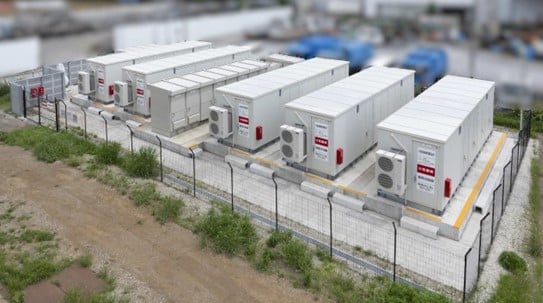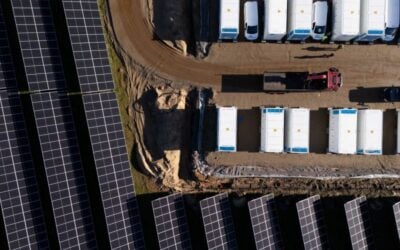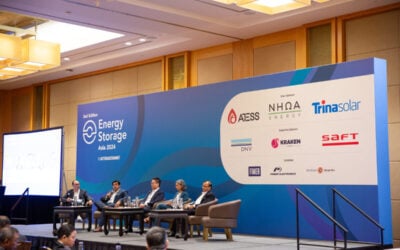
A ‘smart energy’ subsidiary of Japan’s biggest telecommunications company, NTT, has launched an energy storage plant services division.
NTT Anode Energy, established by Nippon Telegraph and Telephone Group (NTT Group) in 2019, announced last week (23 May) that it will construct and operate energy storage systems (ESS) on behalf of customers.
Japan’s energy storage market is seeing the start of what many believe will be a rapid growth trajectory. The country’s government identified energy storage as a key technology that will enable the decarbonisation of industry and the adoption of renewable energy while maintaining electricity supply stability and security.
Other major companies in Japan’s technology and power industries are investing in the market. This includes the utility companies that, until the liberalisation of the electricity market, held regional monopolies of supply. Two of them recently announced the start of commercial operation of grid-scale battery projects, as reported by Energy-Storage.news.
Try Premium for just $1
- Full premium access for the first month at only $1
- Converts to an annual rate after 30 days unless cancelled
- Cancel anytime during the trial period
Premium Benefits
- Expert industry analysis and interviews
- Digital access to PV Tech Power journal
- Exclusive event discounts
Or get the full Premium subscription right away
Or continue reading this article for free
In addition to the government’s Green Transformation (GX) policy strategy, which includes targets of 40% – 50% renewable energy by 2040, power plant regulations have been updated to include a definition of energy storage systems as separate from generation or load.
Asset owners and investors can access at least three revenue streams from electricity market participation, in addition to major subsidy schemes to lower Capex costs of equipment investment: one offered by the national government’s Ministry of Economy, Trade and Industry (METI), the other by the Tokyo Metropolitan Government.
In an interview with ESN Premium, to be published in the coming days, executives from the Japan office of international energy storage developer Eku Energy will discuss the state of the market, including the fundamental drivers and the business models.
Eku Energy was one of the developers awarded a 20-year capacity market contract in the most recently held Long-Term Decarbonisation Power Source Auction (LTDA) round.
Three new NTT Anode Energy projects in Saitama
NTT Anode Energy said it will leverage experience and lessons from the development, construction, and operation of its own portfolio of battery energy storage system (BESS) assets, which totals 340MWh across 23 locations, in nine of Japan’s regional electricity grid service areas.
NTT Anode Energy brought online its first BESS plant, a 1MW/4MWh system, in 2023 on the southern island of Kyushu, in partnership with utility Kyushu Electric (Kyuden) and technology provider Mitsubishi.
A day before the latest announcement, NTT Anode Energy said it had brought three more BESS projects into commercial operation.
The trio of lithium-ion (Li-ion) battery systems are all in Saitama prefecture, Tokyo’s northern neighbour.
Saitama Wako Storage Battery is 1MW/5MWh and went into operation in January. Saitama Miyoshi Power Storage Plant is 2MW/10MWh and went into operation in April. Saitama Tsurugashima Power Storage Plant is also 2MW/10MWh and went into operation earlier this month.
NTT Anode Energy will act as the BESS assets’ aggregator and route-to-market optimiser, controlling their participation in the wholesale, supply-and-demand adjustment, and capacity markets.
The NTT subsidiary will also optimise the projects’ charge-discharge cycles, remote monitoring and centralised maintenance.
The projects benefited from the Tokyo Metropolitan Government’s ESS subsidy scheme, which offers up to 50% of the upfront Capex requirement for successful projects through a competitive selection process.
Optimisation offering
NTT Anode Energy will begin its end-to-end third-party construction and operation service offering in July through its NTT GX brand.
The company’s own forecasting and optimisation engine for distributed energy assets, including batteries, forecasts solar PV generation and electricity market price activity, utilising the data and artificial intelligence (AI) assets of its parent, NTT Group.
For the construction of plants, NTT said it would ensure high availability and safety by utilising a network of multiple vendors. It also claimed the company’s experience in the ESS market has enabled it to reduce technology risks, such as managing degradation profiles and the compatibility and interoperability of equipment including power conversion systems (PCS) and energy management systems (EMS).





